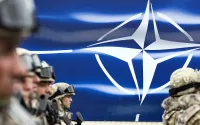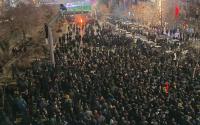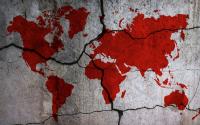Published on Tuesday, July 22, 2003 by the Buffalo News (New York)by Anthony Cardinale
The American use of depleted uranium munitions in both Persian Gulf wars has unleashed a toxic disaster that will eclipse the Agent Orange tragedy of the Vietnam War, a former top Army official said Monday evening.
Former Maj. Douglas Rokke, who was director of the Army's depleted uranium project, spoke to 125 people at the Buffalo & Erie County Historical Society. The Champaign, Ill., science professor was brought here by the Western New York Peace Center.
"I am a warrior," the 54-year-old Vietnam War veteran began. "The sole purpose of war is to kill and destroy. There are no winners."
Dressed in sneakers, blue jeans and a red polo shirt, Rokke fit the image of an animated science professor, hair tousled, adjusting his glasses and eager to impart his findings to the next generation.
If what he says is true, students will soon have yet another chapter of heartbreaking history to study in the schools. If he is wrong, it will take years to disprove.
Called to active duty in 1990, Rokke said, he was assigned to develop procedures for cleaning up uranium contamination after "they decided to use depleted uranium munitions" in the war to expel Iraq from Kuwait.
"They didn't tell anybody what they were doing. Why would they? Depleted uranium munitions are the ultimate weapon. Each round fired by an Abrams tank (represents) 10 pounds of solid uranium-238. The purpose of war is to kill and destroy."
Rokke said his team in the gulf blew up vehicles and structures with these munitions and then tested the wreckage for radioactive contamination. He said they found that uranium dust is so fine that it acts like a gas, seeping through the tiny pores of protective masks.
The United States blew up Saddam Hussein's weapons of mass destruction in Iraq, in Kuwait and on the Saudi Arabian border in the first gulf war, Rokke said. As a precaution, American personnel were inoculated before entering the field, but "we were told not to record it, and it's not in the soldiers' medical records."
Uranium munitions were also used during the recent war in Iraq, he added.
"It's like playing darts," he said, "except you're playing with 10 pounds of solid uranium and it catches fire immediately. You lose nearly 40 percent of the round in uranium dust. It contaminates air, water and soil for all eternity."
Rokke said an "infamous memo" from the Los Alamos National Laboratory in New Mexico on March 1, 1991, warned of the "impact on the environment" of depleted uranium rounds and suggested that they "may become politically unacceptable." Today he interprets the memo as "a direct order to lie."
The memo from Los Alamos - where the first atomic bombs were developed and tested during World War II - prevented the military from acknowledging the danger of these munitions, Rokke said.
"The United States used 375 tons in Gulf War I," Rokke said. "My orders were to take care of U.S. casualties and vehicles" that had been hit by "friendly fire.'
"Myself and my team members started to get sick almost immediately. It started with respiratory problems, then rashes."
But the procedures developed by his team were never implemented, Rokke said, despite a military order of June 1991 to treat these personnel. Recalling a wounded friend who suffered tumors where uranium shrapnel had been left in his body, he said the authorities found "no compelling evidence" of a connection and refused to authorize removal of the shrapnel or special treatment.
In his own case, Rokke added, his body has six times the amount of uranium that usually requires medical care but has received no help or advice from the government.
"The technology of war is out of control," Rokke concluded. "We don't have the ability to clean it up (or) treat it. I'm a warrior, but my conclusion is that war is obsolete. A U.S. Department of Veterans Affairs report says over 221,000 of our sons and daughters are on permanent disability and over 10,000 dead - one-third of our Gulf War I force. And they're coming back sick right now."






